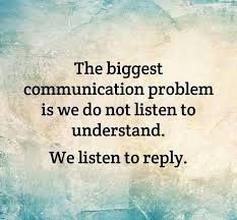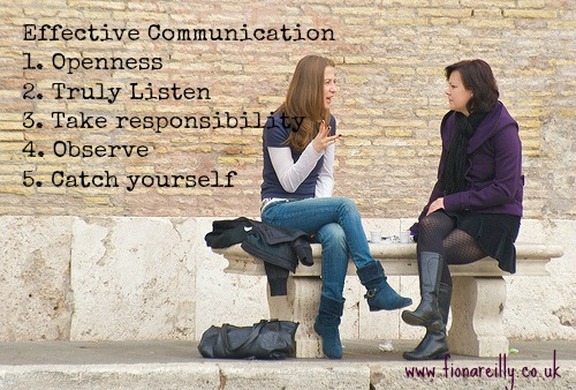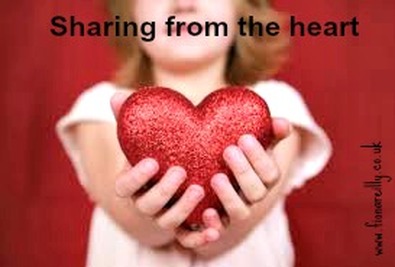In contrast when we don't express ourselves it can cause tightness, disharmony and build resentments. When we courageously embrace the vulnerability and risk in sharing from the heart, the rewards and potential for increased feelings of connectedness and intimacy are great. In this article I suggest 5 strategies that can help us in communicating more effectively:

An important component of good communication is discerning what is appropriate to share, when and how. Sometimes we hold back because we are afraid of hurting the other persons feelings or that they won't like what we have to say. While it is important to be respectful and honour the other, it is also important that we express what we need to. It can take a lot of courage to express something that feels sensitive with another. I know when someone expresses something to me with honesty and integrity, even though I may not like it or find it challenging, I am generally grateful for their sharing. Such openness and honesty can enhance trust and deepen relationships. Each situation is unique and we need to feel what is right in the moment.
2. Truly listen - to truly listen we need to be attentive and focused on what the other person is communicating. This can be difficult to achieve, especially in the fast paced, distraction-full world that we live. Can we truly listen without interrupting or changing the focus even when we feel uncomfortable? Many years ago when I did some counselling training, we participated in some exercises on active listening, I like many others in the group was surprised at how rarely we seemed to truly listen. I invite you to watch yourself and see how well you listen.
When engaged in a conversation we are often not fully present to the other, we may be thinking about our own response, what we will have for dinner or some other external distraction. When we can be present and fully engaged with the other it enables us to empathize much more effectively and allows them to truly feel heard. Such deep listening can be very healing and support another immensely. Another key aid to powerful engagement is to become comfortable with silences and let go of any need to rush in and fill gaps in conversation.
3. Take responsibility - We are each responsible for our feelings and emotions and have created the circumstances in which we find ourselves. I have found it invaluable to be mindful about how I express to others and take responsibility for my own feelings. So for example, rather than stating "You made me so angry when you..." saying "I felt very angry when that happened..." can be so beneficial. It means that the listener is less likely to feel blamed or become defensive allowing the communication channels to remain open and flowing.
Be clear about what you communicate and ensure you understand what the other person is communicating. It is great to ask for clarity if you are unsure. It is important to find the right time and place for exchanges to take place. If my emotions are high, I find a conversation is best postponed until I am feeling calmer and more balanced. Additionally it is beneficial to avoid distractions, such as mobile phones.
4. Observe what is happening in your body and emotional field, as well as what is happening with those you are communicating with. I often notice that my body can give me clues as to what is really going on, even if my mind might suggest otherwise. For example, if I am saying something that is not quite aligned and simultaneously notice that my solar plexus or gut tightens, I recognise that there is an incongruence and see this as an invitation to explore deeper what might be happening in that moment.
You can also monitor what is happening with the other person and the energy field around you both. Often when we pay attention, we will notice nonverbal cues that can indicate much more than the words spoken. It is suggested (ref wikipedia) that two thirds of what we communicate is nonverbal. I had an example of this when engaging with a woman who was talking about difficulties with her husband and she unconsciously kept fiddling with and removing her wedding ring.
5. Watch and catch yourself - We often react from well established patterns or ways of behaving or through a distortion. Some of the patterns I have identified in myself include a need to be right or taking issues as a personal attack. If I can catch when I am reacting from a pattern and admit it e.g. "I am being reactive just now" or "This is reminding me of how I interacted with my mother", it changes the energy immediately and I find things lose their previous tight grip. It also means that we are being more transparent for the other person and they can identify with us more readily. Recognizing such patterns offers a wonderful opportunity to explore deeper what might be at the root of what is going on.
We all have certain prejudices about the world and other people that can be subtle and almost automatic. For example, we may feel that we know more than the other or that they know more than us. It is invaluable if we can catch and explore these judgements, so that we can dissolve them and become more open to what the other person is saying, especially if it doesn't match with our own world view. Such rich engagements open us up to different ideas and options, and offer us a wonderful mirror to see the world differently.
Namaste, Fiona


 RSS Feed
RSS Feed